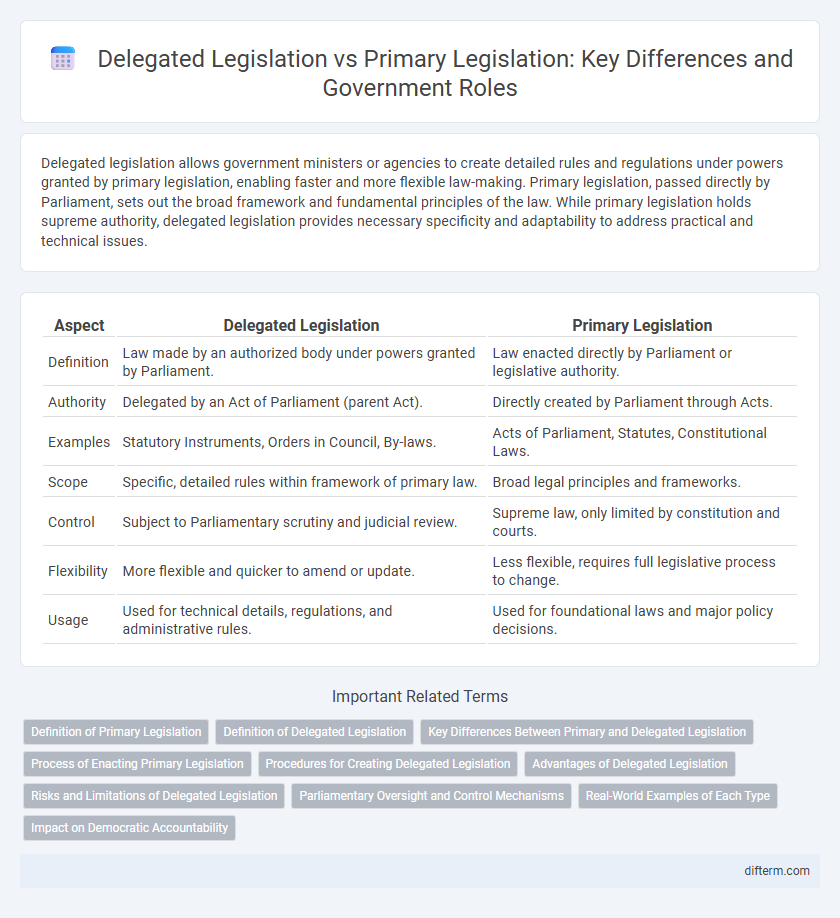Delegated legislation allows government ministers or agencies to create detailed rules and regulations under powers granted by primary legislation, enabling faster and more flexible law-making. Primary legislation, passed directly by Parliament, sets out the broad framework and fundamental principles of the law. While primary legislation holds supreme authority, delegated legislation provides necessary specificity and adaptability to address practical and technical issues.
Table of Comparison
| Aspect | Delegated Legislation | Primary Legislation |
|---|---|---|
| Definition | Law made by an authorized body under powers granted by Parliament. | Law enacted directly by Parliament or legislative authority. |
| Authority | Delegated by an Act of Parliament (parent Act). | Directly created by Parliament through Acts. |
| Examples | Statutory Instruments, Orders in Council, By-laws. | Acts of Parliament, Statutes, Constitutional Laws. |
| Scope | Specific, detailed rules within framework of primary law. | Broad legal principles and frameworks. |
| Control | Subject to Parliamentary scrutiny and judicial review. | Supreme law, only limited by constitution and courts. |
| Flexibility | More flexible and quicker to amend or update. | Less flexible, requires full legislative process to change. |
| Usage | Used for technical details, regulations, and administrative rules. | Used for foundational laws and major policy decisions. |
Definition of Primary Legislation
Primary legislation refers to laws enacted directly by a legislative body, such as an act of Parliament or Congress, serving as the highest legal authority within a jurisdiction. These statutes establish broad legal principles and frameworks, laying the foundation for governance and public policy. Unlike delegated legislation, primary legislation cannot be overturned or amended by subordinate authorities, ensuring its supremacy in the legal hierarchy.
Definition of Delegated Legislation
Delegated legislation refers to laws or regulations made by an individual or body other than the legislature, under powers granted by an enabling Act of Parliament. It allows specific authorities, such as government ministers or agencies, to create detailed rules and provisions necessary for the implementation of primary legislation. This form of legislation facilitates efficient governance by enabling the modification or supplementation of primary laws without requiring a full parliamentary process.
Key Differences Between Primary and Delegated Legislation
Primary legislation consists of laws enacted directly by Parliament, establishing fundamental legal frameworks and broad policy decisions. Delegated legislation, also known as secondary legislation, is created by an individual or body authorized by Parliament to fill in details or practical measures under the framework of primary legislation. Key differences include the source of authority, with primary legislation originating from Parliament and delegated legislation derived from powers granted by primary law, as well as the scope, complexity, and speed of the legislative process.
Process of Enacting Primary Legislation
The process of enacting primary legislation begins with the drafting of a bill, which undergoes multiple readings and debates in both houses of Parliament to ensure thorough scrutiny and democratic approval. After passing all legislative stages, the bill receives Royal Assent, transforming it into an Act of Parliament with full legal authority. This rigorous parliamentary procedure contrasts with delegated legislation, where Parliament grants specific bodies the power to create detailed regulations without undergoing the full legislative process.
Procedures for Creating Delegated Legislation
Delegated legislation is created through powers granted by an Act of Parliament, allowing ministers or other authorities to make detailed rules without passing a new Act. Procedures for creating delegated legislation include affirmative resolution, where the legislation requires explicit parliamentary approval, and negative resolution, where legislation becomes law unless annulled by parliament within a set period. These processes ensure a balance between efficient law-making and parliamentary oversight in government regulation.
Advantages of Delegated Legislation
Delegated legislation offers greater flexibility and efficiency compared to primary legislation, allowing government ministers and agencies to respond quickly to changing circumstances without the need for lengthy parliamentary approval. It enables detailed and technical rules to be crafted by experts, ensuring more specialized and precise regulation. This form of lawmaking also reduces the legislative burden on Parliament, expediting the implementation of policies.
Risks and Limitations of Delegated Legislation
Delegated legislation poses risks such as limited parliamentary scrutiny, increasing the potential for inadequate oversight and unchecked executive power. The complexity and volume of delegated laws often lead to reduced transparency and difficulty for citizens to fully understand their legal rights. Furthermore, the delegation of legislative authority may result in inconsistent application and challenges in ensuring accountability within the government framework.
Parliamentary Oversight and Control Mechanisms
Parliament exercises oversight of delegated legislation through mechanisms such as affirmative and negative resolution procedures, enabling scrutiny before or after enactment. Select committees play a crucial role in examining statutory instruments for consistency with enabling Acts and potential procedural breaches. While primary legislation undergoes full parliamentary debate and approval, delegated legislation faces more limited but targeted control frameworks to balance legislative efficiency with democratic accountability.
Real-World Examples of Each Type
Primary legislation, such as the United States Congress passing the Civil Rights Act of 1964, establishes fundamental legal frameworks directly enacted by legislative bodies. Delegated legislation involves detailed regulations made by government ministers under powers granted by primary laws, exemplified by the UK's Health and Safety Executive issuing specific workplace safety regulations under the Health and Safety at Work Act 1974. Real-world examples highlight how primary legislation sets broad legal principles while delegated legislation provides practical rules necessary for implementation and enforcement.
Impact on Democratic Accountability
Delegated legislation allows government ministers or agencies to create detailed rules under powers granted by primary legislation, enabling faster response to changing needs but potentially reducing direct parliamentary scrutiny. This shift can impact democratic accountability by limiting elected representatives' oversight and debate over specific regulations. However, procedures like parliamentary committees and consultation processes aim to balance efficiency with maintaining democratic control.
Delegated Legislation vs Primary Legislation Infographic

 difterm.com
difterm.com